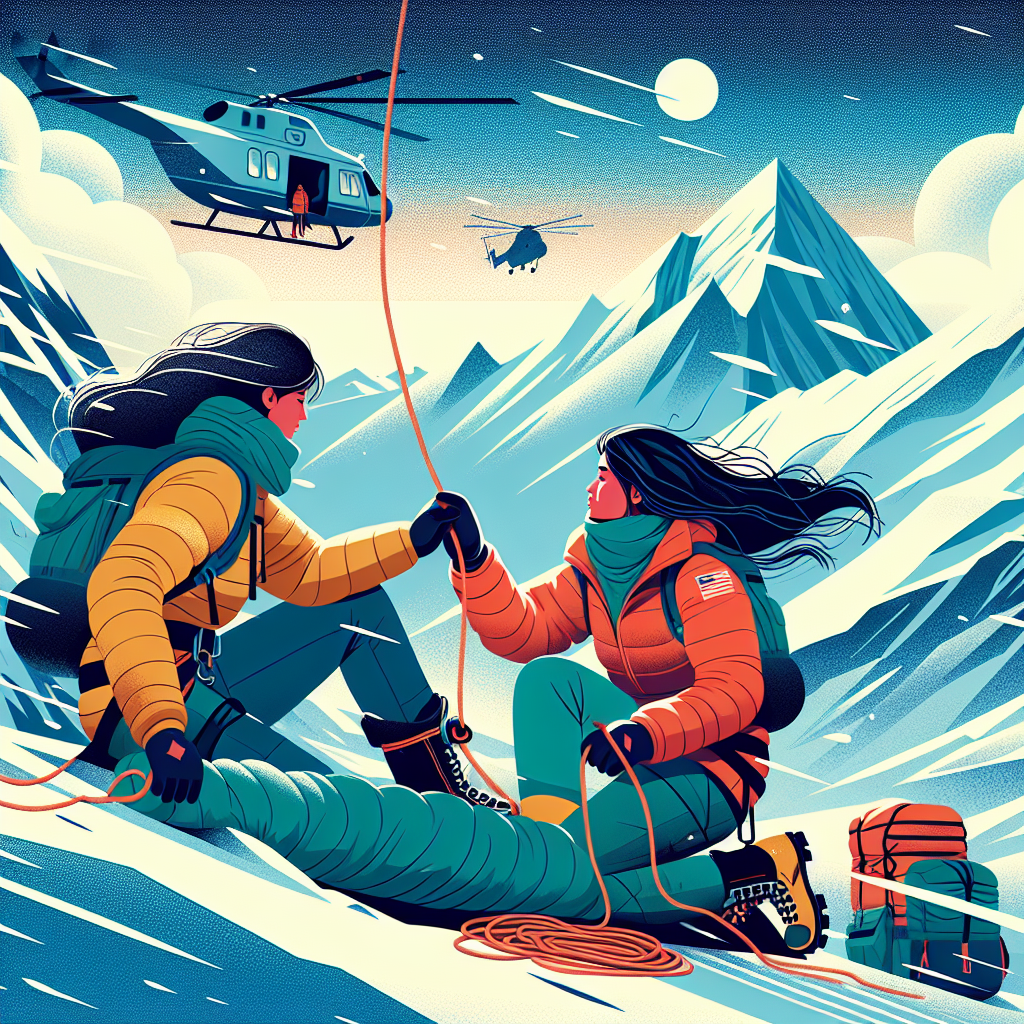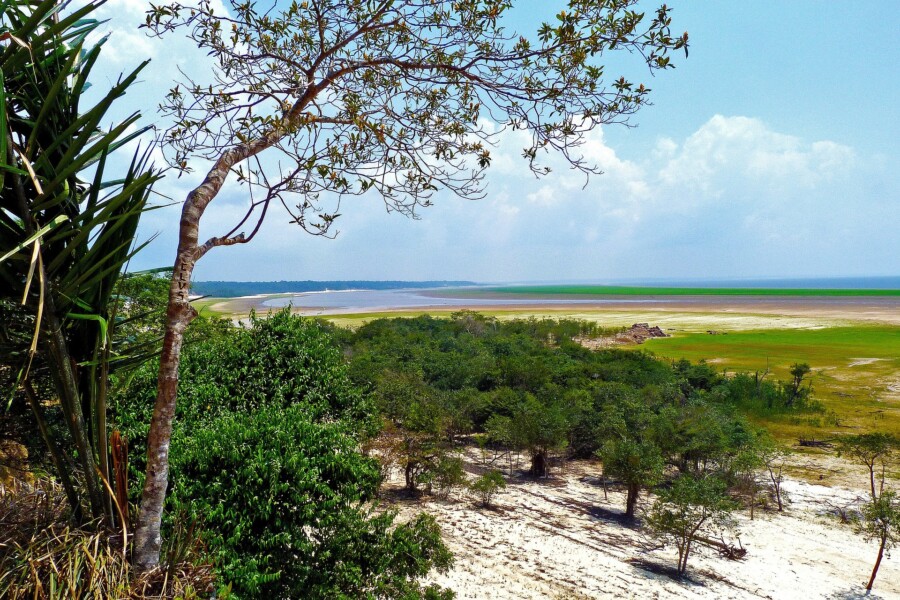A British climber, Fay Manners, and her climbing partner, Michelle Dvorak, were rescued after being stranded on Chaukhamba mountain in northern India for three days. The pair faced harsh conditions after the rope carrying their supplies snapped, leaving them without essential gear. Despite sending an emergency message, search and rescue teams initially struggled to locate them.
Ms. Manners, an experienced alpinist living in Chamonix, France, described feeling despair as they lost their safety equipment and supplies. The duo had to endure extreme cold, lack of food, and challenging terrain while waiting for rescue. They shared a single sleeping bag, battled hypothermia, and survived on minimal water before being spotted by a helicopter.
After a failed attempt by the helicopter to rescue them due to adverse weather conditions, Ms. Manners and her partner decided to descend the mountain face on their own. They encountered French climbers who provided crucial assistance, including equipment, food, and guidance. The rescuers facilitated their safe passage across treacherous terrain, ultimately leading to their rescue.
Ms. Manners, known for her climbing achievements, emphasized the importance of proper equipment and preparation in mountain expeditions. Despite the ordeal, she remains determined to inspire women to pursue alpinism and mountaineering. The incident, while rare, highlighted the resilience and survival skills required in such challenging environments.
Following their rescue, Ms. Manners and her partner expressed gratitude for the support received and planned to enjoy local Indian cuisine before returning home. The Foreign, Commonwealth & Development Office confirmed their safe rescue and continued support for the family. The climbers’ harrowing experience serves as a reminder of the unpredictable nature of mountain climbing and the importance of safety measures in such endeavors.
Original news source: Climbers rescued after three days on mountain (BBC)
🎧 Listen:
Slow
Normal
Fast
📖 Vocabulary:
| 1 | stranded | Left in a difficult or helpless situation |
| 2 | alpinist | A person who climbs mountains, especially in the Alps |
| 3 | despair | A feeling of hopelessness or loss of hope |
| 4 | endure | To suffer through something difficult or unpleasant |
| 5 | hypothermia | A dangerous condition caused by extreme cold |
| 6 | adverse | Unfavorable or harmful |
| 7 | descend | To move downwards, typically from a higher place |
| 8 | treacherous | Dangerous and unpredictable, often involving hidden risks |
| 9 | emphasized | Stressed the importance of something |
| 10 | expedition | A journey or voyage undertaken for a specific purpose |
| 11 | resilience | The ability to recover quickly from difficulties |
| 12 | gratitude | A feeling of thankfulness and appreciation |
| 13 | harrowing | Extremely distressing or disturbing |
| 14 | unpredictable | Not able to be predicted or foreseen |
| 15 | endeavors | Attempts or efforts to achieve a goal or complete a task |
Group or Classroom Activities
Warm-up Activities:
– Charades
Instructions: Choose key words or phrases from the article related to the climbers’ rescue story. Without speaking, act out these words or phrases while your classmates try to guess what you are portraying. This will help reinforce vocabulary from the article in a fun and interactive way.
– News Summary
Instructions: In pairs or small groups, summarize the climbers’ rescue story in your own words. Include the main events, challenges faced, and the outcome of the story. Then, take turns presenting your summaries to the class. This activity will practice paraphrasing and storytelling skills.
– Opinion Poll
Instructions: Create a set of questions related to the climbers’ rescue story, such as “Do you think the climbers were well-prepared for their expedition?” or “Should mountain climbing regulations be stricter?” Have students answer the questions individually, then discuss their opinions in pairs or small groups. This activity will encourage critical thinking and discussion in English.
– Vocabulary Pictionary
Instructions: Select key vocabulary words from the article and write them on separate pieces of paper. In pairs or small groups, take turns choosing a word and drawing it while your partner(s) guess the word. This activity will reinforce vocabulary retention and encourage creativity in describing words through drawings.
– Think-Pair-Share
Instructions: Reflect on the climbers’ rescue story and think about a time when you faced a challenging situation. In pairs, share your experiences with your partner, discussing how you overcame the challenge and what you learned from it. Then, share some of the partner’s insights with the class to practice speaking and listening skills.
🤔 Comprehension Questions:
1. What caused Fay Manners and Michelle Dvorak to be stranded on Chaukhamba mountain?
2. How did the climbers feel when they lost their safety equipment and supplies?
3. What challenges did Fay Manners and her climbing partner face while waiting for rescue?
4. Why did the helicopter initially fail to rescue the stranded climbers?
5. How did the French climbers who encountered Fay Manners and Michelle Dvorak help them?
6. What message did Fay Manners want to convey about the importance of equipment in mountain expeditions?
7. What did the climbers plan to do after being rescued?
8. How did the climbers’ experience on Chaukhamba mountain highlight the importance of safety measures in mountain climbing?
Go to answers ⇩
🎧✍️ Listen and Fill in the Gaps:
A British climber, Fay Manners, and her climbing partner, Michelle Dvorak, were (1)______ after being stranded on Chaukhamba mountain in (2)______ India for three days. The pair faced harsh conditions after the rope carrying their supplies snapped, leaving them without essential gear. Despite sending an emergency message, search and rescue teams initially struggled to locate them.
Ms. Manners, an (3)______ alpinist living in Chamonix, France, (4)______ feeling despair as they lost their safety equipment and (5)______. The duo had to (6)______ extreme cold, lack of food, and challenging terrain while waiting for (7)______. They shared a single sleeping bag, battled (8)______, and survived on minimal water before being spotted by a helicopter.
After a failed attempt by the helicopter to rescue them due to adverse weather conditions, Ms. Manners and her partner decided to descend the mountain face on their own. They encountered French climbers who provided crucial (9)______, including equipment, food, and guidance. The rescuers facilitated their safe passage across treacherous terrain, ultimately leading to their rescue.
Ms. Manners, known for her climbing achievements, emphasized the importance of (10)______ equipment and preparation in mountain expeditions. Despite the ordeal, she remains determined to inspire women to pursue (11)______ and (12)______. The incident, while rare, highlighted the resilience and survival skills required in such challenging environments.
Following their rescue, Ms. Manners and her partner expressed gratitude for the support received and (13)______ to enjoy local (14)______ cuisine before returning home. The Foreign, Commonwealth & Development Office confirmed their safe rescue and continued support for the family. The climbers’ harrowing (15)______ serves as a reminder of the unpredictable nature of mountain climbing and the (16)______ of safety measures in such endeavors.
Go to answers ⇩
💬 Discussion Questions:
Students can ask a partner these questions, or discuss them as a group.
1. What do you think it takes to survive in extreme conditions like the climbers did on Chaukhamba mountain?
2. How do you think the experience of being stranded on a mountain for three days would change a person?
3. Do you believe that women face unique challenges in the world of alpinism and mountaineering? Why or why not?
4. How important do you think mental strength is in surviving a situation like the one Ms. Manners and her partner faced?
5. Have you ever been in a situation where you had to rely on the help of strangers? How did it feel?
6. Do you think it’s worth risking your life for the thrill of mountain climbing? Why or why not?
7. How would you react if you were in a similar situation as the climbers, facing extreme cold, lack of food, and challenging terrain?
8. What do you think motivates people like Ms. Manners to continue pursuing dangerous activities like mountain climbing after such a harrowing experience?
9. Why do you think the climbers decided to descend the mountain face on their own instead of waiting for the helicopter to return?
10. How do you think the support and assistance from the French climbers impacted Ms. Manners and her partner’s ability to survive?
11. Would you consider pursuing alpinism or mountaineering as a hobby after hearing about this incident? Why or why not?
12. How do you think this experience will influence Ms. Manners’ future climbing endeavors and goals?
13. Do you think it’s possible to truly prepare for all the risks and challenges of mountain climbing? Why or why not?
14. How do you think the climbers’ families felt during the three days they were stranded on the mountain?
15. In your opinion, what can be done to improve safety measures for climbers in remote and challenging environments like Chaukhamba mountain?
Individual Activities
📖💭 Vocabulary Meanings:
Match each word to its meaning.
Words:
1. stranded
2. alpinist
3. despair
4. endure
5. hypothermia
6. adverse
7. descend
8. treacherous
9. emphasized
10. expedition
11. resilience
12. gratitude
13. harrowing
14. unpredictable
15. endeavors
Meanings:
(A) A dangerous condition caused by extreme cold
(B) Dangerous and unpredictable, often involving hidden risks
(C) Left in a difficult or helpless situation
(D) Stressed the importance of something
(E) Not able to be predicted or foreseen
(F) A person who climbs mountains, especially in the Alps
(G) A feeling of thankfulness and appreciation
(H) Extremely distressing or disturbing
(I) Attempts or efforts to achieve a goal or complete a task
(J) To suffer through something difficult or unpleasant
(K) A journey or voyage undertaken for a specific purpose
(L) Unfavorable or harmful
(M) The ability to recover quickly from difficulties
(N) A feeling of hopelessness or loss of hope
(O) To move downwards, typically from a higher place
Go to answers ⇩
🔡 Multiple Choice Questions:
1. Where were Fay Manners and Michelle Dvorak rescued from?
(a) Mount Everest in Nepal
(b) Kilimanjaro in Tanzania
(c) Chaukhamba mountain in northern India
(d) Mount McKinley in Alaska
2. What happened to the rope carrying the climbers’ supplies?
(a) It got tangled
(b) It was too short
(c) It was stolen
(d) It snapped
3. What did the climbers have to endure while waiting for rescue?
(a) Hot weather and plenty of food
(b) Comfortable conditions and easy terrain
(c) Extreme cold, lack of food, and challenging terrain
(d) Warm temperatures and a surplus of supplies
4. What did Ms. Manners and her partner have to survive on while stranded?
(a) Minimal water
(b) Abundant food
(c) Hot beverages
(d) Fresh fruit
5. How did Ms. Manners and her partner decide to descend the mountain face?
(a) With the help of a helicopter
(b) On their own
(c) Using a ski lift
(d) By calling for a rescue team
6. Who provided crucial assistance to Ms. Manners and her partner during their descent?
(a) French climbers
(b) Italian climbers
(c) German climbers
(d) Swiss climbers
7. What did Ms. Manners emphasize the importance of in mountain expeditions?
(a) Speed and agility
(b) Proper equipment and preparation
(c) Luck and chance
(d) Following the crowd
8. What did Ms. Manners and her partner plan to enjoy after their rescue?
(a) Fast food
(b) A fancy restaurant
(c) Home-cooked meals
(d) Local Indian cuisine
Go to answers ⇩
🕵️ True or False Questions:
1. The climbers encountered rough conditions after the rope holding their equipment broke.
2. Fay Manners and Michelle Dvorak were stranded on Chaukhamba mountain in northern India for three days.
3. Despite sending an emergency message, search and rescue teams initially struggled to locate the stranded climbers.
4. Ms. Manners continues to strive to encourage women to explore alpinism and mountaineering despite the manageable ordeal.
5. French climbers offered valuable help, including equipment, food, and guidance to Ms. Manners and her partner.
6. The climbers shared a single sleeping bag and battled hypothermia before being rescued.
7. The helicopter initially failed to rescue the climbers due to adverse weather conditions.
8. The pair had to withstand moderate cold, shortage of food, and manageable terrain while awaiting rescue.
Go to answers ⇩
📝 Write a Summary:
Write a summary of this news article in two sentences.
Check your writing now with the best free AI for English writing!
Writing Questions:
Answer the following questions. Write as much as you can for each answer.
Check your answers with our free English writing assistant!
1. What challenges did Fay Manners and Michelle Dvorak face while stranded on Chaukhamba mountain in northern India?
2. How did search and rescue teams initially struggle to locate Fay Manners and Michelle Dvorak despite receiving an emergency message from them?
3. What role did French climbers play in assisting Fay Manners and Michelle Dvorak during their descent from the mountain face?
4. How did Fay Manners emphasize the importance of proper equipment and preparation in mountain expeditions following the rescue?
5. What lessons can be learned from the climbers’ harrowing experience on Chaukhamba mountain in terms of safety measures for mountain climbing?
✅ Answers
🤔✅ Comprehension Question Answers:
1. What caused Fay Manners and Michelle Dvorak to be stranded on Chaukhamba mountain?
The rope carrying their supplies snapped, leaving them without essential gear.
2. How did the climbers feel when they lost their safety equipment and supplies?
They described feeling despair as they faced harsh conditions without the necessary gear.
3. What challenges did Fay Manners and her climbing partner face while waiting for rescue?
They had to endure extreme cold, lack of food, battled hypothermia, and survived on minimal water.
4. Why did the helicopter initially fail to rescue the stranded climbers?
The helicopter failed due to adverse weather conditions.
5. How did the French climbers who encountered Fay Manners and Michelle Dvorak help them?
The French climbers provided crucial assistance, including equipment, food, and guidance, facilitating their safe passage across treacherous terrain.
6. What message did Fay Manners want to convey about the importance of equipment in mountain expeditions?
She emphasized the importance of proper equipment and preparation in mountain expeditions.
7. What did the climbers plan to do after being rescued?
They planned to enjoy local Indian cuisine before returning home.
8. How did the climbers’ experience on Chaukhamba mountain highlight the importance of safety measures in mountain climbing?
Their experience highlighted the unpredictable nature of mountain climbing and the importance of safety measures in such challenging environments.
Go back to questions ⇧
🎧✍️✅ Listen and Fill in the Gaps Answers:
(1) rescued
(2) northern
(3) experienced
(4) described
(5) supplies
(6) endure
(7) rescue
(8) hypothermia
(9) assistance
(10) proper
(11) alpinism
(12) mountaineering
(13) planned
(14) Indian
(15) experience
(16) importance
Go back to questions ⇧
📖💭✅ Vocabulary Meanings Answers:
1. stranded
Answer: (C) Left in a difficult or helpless situation
2. alpinist
Answer: (F) A person who climbs mountains, especially in the Alps
3. despair
Answer: (N) A feeling of hopelessness or loss of hope
4. endure
Answer: (J) To suffer through something difficult or unpleasant
5. hypothermia
Answer: (A) A dangerous condition caused by extreme cold
6. adverse
Answer: (L) Unfavorable or harmful
7. descend
Answer: (O) To move downwards, typically from a higher place
8. treacherous
Answer: (B) Dangerous and unpredictable, often involving hidden risks
9. emphasized
Answer: (D) Stressed the importance of something
10. expedition
Answer: (K) A journey or voyage undertaken for a specific purpose
11. resilience
Answer: (M) The ability to recover quickly from difficulties
12. gratitude
Answer: (G) A feeling of thankfulness and appreciation
13. harrowing
Answer: (H) Extremely distressing or disturbing
14. unpredictable
Answer: (E) Not able to be predicted or foreseen
15. endeavors
Answer: (I) Attempts or efforts to achieve a goal or complete a task
Go back to questions ⇧
🔡✅ Multiple Choice Answers:
1. Where were Fay Manners and Michelle Dvorak rescued from?
Answer: (c) Chaukhamba mountain in northern India
2. What happened to the rope carrying the climbers’ supplies?
Answer: (d) It snapped
3. What did the climbers have to endure while waiting for rescue?
Answer: (c) Extreme cold, lack of food, and challenging terrain
4. What did Ms. Manners and her partner have to survive on while stranded?
Answer: (a) Minimal water
5. How did Ms. Manners and her partner decide to descend the mountain face?
Answer: (b) On their own
6. Who provided crucial assistance to Ms. Manners and her partner during their descent?
Answer: (a) French climbers
7. What did Ms. Manners emphasize the importance of in mountain expeditions?
Answer: (b) Proper equipment and preparation
8. What did Ms. Manners and her partner plan to enjoy after their rescue?
Answer: (d) Local Indian cuisine
Go back to questions ⇧
🕵️✅ True or False Answers:
1. The climbers encountered rough conditions after the rope holding their equipment broke. (Answer: False)
2. Fay Manners and Michelle Dvorak were stranded on Chaukhamba mountain in northern India for three days. (Answer: True)
3. Despite sending an emergency message, search and rescue teams initially struggled to locate the stranded climbers. (Answer: True)
4. Ms. Manners continues to strive to encourage women to explore alpinism and mountaineering despite the manageable ordeal. (Answer: False)
5. French climbers offered valuable help, including equipment, food, and guidance to Ms. Manners and her partner. (Answer: False)
6. The climbers shared a single sleeping bag and battled hypothermia before being rescued. (Answer: True)
7. The helicopter initially failed to rescue the climbers due to adverse weather conditions. (Answer: True)
8. The pair had to withstand moderate cold, shortage of food, and manageable terrain while awaiting rescue. (Answer: False)
Go back to questions ⇧















